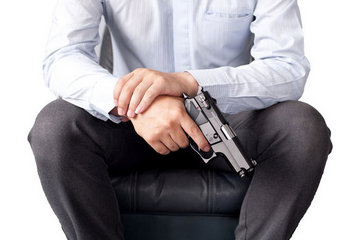Could Arming Teachers Work?

Get the world’s most fascinating discoveries delivered straight to your inbox.
You are now subscribed
Your newsletter sign-up was successful
Want to add more newsletters?

Delivered Daily
Daily Newsletter
Sign up for the latest discoveries, groundbreaking research and fascinating breakthroughs that impact you and the wider world direct to your inbox.

Once a week
Life's Little Mysteries
Feed your curiosity with an exclusive mystery every week, solved with science and delivered direct to your inbox before it's seen anywhere else.

Once a week
How It Works
Sign up to our free science & technology newsletter for your weekly fix of fascinating articles, quick quizzes, amazing images, and more

Delivered daily
Space.com Newsletter
Breaking space news, the latest updates on rocket launches, skywatching events and more!

Once a month
Watch This Space
Sign up to our monthly entertainment newsletter to keep up with all our coverage of the latest sci-fi and space movies, tv shows, games and books.

Once a week
Night Sky This Week
Discover this week's must-see night sky events, moon phases, and stunning astrophotos. Sign up for our skywatching newsletter and explore the universe with us!
Join the club
Get full access to premium articles, exclusive features and a growing list of member rewards.
Schoolchildren returning from winter break could see changes in their local schools, including more security measures and even armed teachers in some places as a result of last month's shooting in Newtown, Conn.
President Obama has said he was skeptical of the idea of arming teachers as a way of combating mass killings. But in Utah, teachers have lined up to take firearms training from a local gun club, while a South Carolina legislator has introduced a bill allowing teachers to take guns to school. The governor of Virginia, Republican Robert McDonnell, is reviewing school safety and said he's open to the idea of putting armed guards in schools.
The National Rifle Association has called for arming teachers, while the country's two biggest teachers's groups' -- the National Education Association and the American Federation of Teachers -- called the proposal "astounding and disturbing," in a joint statement.
SEE ALSO: Can Gun Laws Save Lives?
Albuquerque, Baltimore, Dallas, Houston, Los Angeles, Miami and St. Louis have armed officers in schools, either contracting with local police forces or recruiting their own dedicated security staff. Other cities, including Boston and New York, place unarmed security officers in schools, the New York Times reported.
One recent study in the Journal of Police Crisis Negotiations found that the introduction of police officers in schools helps lower overall violence and gang problems. At the same time, the study found that schools with armed guards tend to experience more violent crime than those without.
"The evidence about more guns suggests that more guns lead to more problems," said Aaron Kupchik, associate professor of sociology and criminal justice at the University of Delaware and author of the 2010 book "Homeroom Security: School Discipline in an Age of Fear."
Get the world’s most fascinating discoveries delivered straight to your inbox.
"More guns in schools is particularly problematic," he added.
SEE ALSO: U.S. Guns by the Numbers
Kupchik has studied school security since the 1990s and says that school administrators have borrowed techniques from the criminal justice system to deal with violence and behavioral problems with school-age children, techniques such as metal detectors, surveillance cameras and zero-tolerance policies with violent behavior or drug use.
The irony is that crime in schools has declined just as it has in the rest of the country, Kupchik said.
"The nationwide drop in school crime is following crime rates generally," Kupchik said. "It may or may not have anything to do with policies they have implemented."
Still, at least one administrator says the placement of armed guards is working to deter bad behavior. Michael Queen, president of the Harrison County Board of Education in West Virginia, says he's seen drug use and behavioral problems decrease in the seven years since the district started hiring local police full-time inside five of the county's 24 schools.
"It's absolutely an undeniable fact that when we put armed police officers in our high schools, drugs in schools went dramatically down and violence with fights went down dramatically," Queen said.
Officers' pay is split between the school district and the local municipality. They also conduct anti-drug, anti-bullying and anti-gang classes inside schools. He'd like to increase their presence to all middle schools as well as elementary schools.
PHOTOS: Where Gun Laws Are Most Lenient
While Queen believes arming teachers is a mistake, he does want to see more security measures such as double-doors and reinforced glass to prevent a would-be shooter from entering the schools.
"We know we have to do something," he said.
One advocate says that the discussion of arming schools is a distraction from the more important issue of controlling access to powerful weapons.
Arming teachers "is not a preventive strategy; it is a reactive strategy," said Ladd Everitt, spokesman for the Coalition to Stop Gun Violence, a non-profit advocacy group. "Once you have a homicidal maniac who has stockpiled weapons legally, you've failed from a public policy perspective."
The fact that we are talking about armed guards and armed teachers, and talking about putting kids in the middle of shootouts is insane," he added.
Everitt noted that armed guards didn't deter killers at Columbine High School or Virginia Tech.
The debate over gun control after the Sandy Hook Elementary School shooting is likely to continue during the next session of Congress. Members return to Washington on Thursday.
This story was provided by Discovery News.
 Live Science Plus
Live Science Plus










